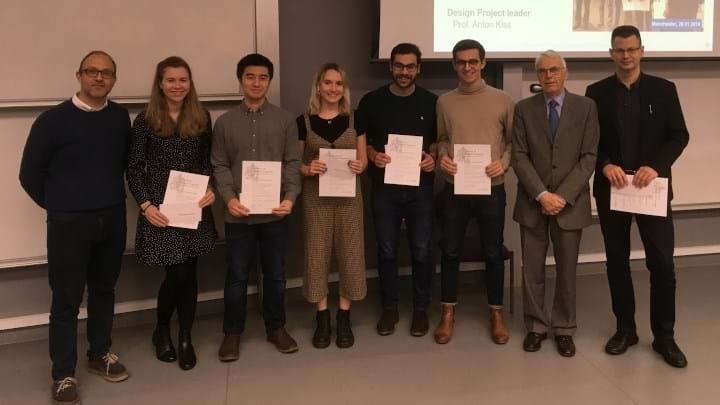Manchester Uni students win IChemE prize for designing greener process

A TEAM of students from University of Manchester, UK, has won IChemE’s Macnab-Lacey Prize for their design of a more sustainable process to produce dimethyl carbonate.
The prize, now in its ninth year and awarded annually, is run by IChemE’s Sustainability Special Interest Group (SIG) and is open to all student teams from accredited chemical engineering departments across the world. It is awarded annually to the student design project that best shows how chemical engineering practice can contribute to a more sustainable world.
The Manchester team won for their project Greenhouse Gas to Green Solvent: Sustainable Production of Dimethyl Carbonate from Carbon Dioxide. Dimethyl carbonate (DMC) has a range of uses including as a solvent and methylating agent. It is produced at industrial scale through a number of routes including transesterification. This involves reacting ethylene oxide with carbon dioxide to produce ethylene carbonate, which is followed by the transesterification of ethylene carbonate with methanol into DMC and ethylene glycol.
The team offered an alternative design that involves three stages: synthesising urea from ammonia and carbon dioxide; then reacting the urea with ethylene glycol to produce ethylene carbonate; which in turn is reacted with methanol to produce DMC. The team designed individual unit operations to optimise the process.
The team’s members are Elizabeth Roberts, Kristianto Gozali, Georgina Vickers, Lefteris Tsiakkis, Mattis Francois, Kyrie Hobson and Brenda Wiputeri.
Commenting on the design, Malcolm Wilkinson, Chair of the Sustainability SIG, explained that the overall process allows the ammonia by-product of the second reaction to be recycled into the first, while the ethylene glycol by-product of the final reaction is recycled to the second. He noted that as well as eliminating by-product wastes the design also avoids the use of toxic and highly flammable ethylene oxide.
“The Manchester entry thoughtfully considered process options and location at the outset and design decisions were all guided by the desire to have minimal environmental impact, economic viability, and stability within the community impacted by the plant. There was excellent complimentary use of sustainability metrics – emissions, energy and raw materials usage – and safety,” Wilkinson said.
“The combination of technical design and continuous assessment in terms of sustainability measures resulted in a convincing design.”
The winners were presented with their certificates in January at the University of Manchester and share a cash prize of £750 (US$975).
Recent Editions
Catch up on the latest news, views and jobs from The Chemical Engineer. Below are the four latest issues. View a wider selection of the archive from within the Magazine section of this site.




